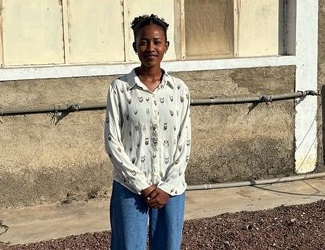By Anwar Hussen Mohammed – Eleni Kebede, 20, was born in Batu town also known as Ziway, 168 kilometers from Ethiopia’s capital, Addis Ababa. She is now first year student at Wachemo University. Her study began sixteen years ago at Sher Ethiopia School, which was established by the biggest flower farm in the country – Sher Ethiopia.
She was only 4 years old when her mother who works at the farm dropped her at the school before starting work. So that she didn’t have to worry about Eleni as all the necessary things including meals, sleeping and playing materials with people who take care of the children are already prepared by the school free of charge.
Since then, thousands of kids whose parents work at the flower farms and other children from the community have been benefiting from the free education program. “These flower farms have lifted the burden from many families…I urge the community to protect these investments and the government should also support them,” says Pastor Hobicho Debelo, leader of elders and religious fathers in Batu town.

Ziway Roses PLC is one of the five rose farms within Sher Ethiopia rose farm that covers a total of 500 hectares of land. Depending on the size of their farm the five farms sponsor around 200 students every year, according to Ermiyas Solomon, Operational Manager at Ziway Roses. Half of the parents of these children work within the farms while the remaining are selected from the community to benefit from the free school.
“We do these as part of our Corporate Social Responsibility (CSR) and because we are Fairtrade Standard Certificate member,” Mr. Ermiyas says. “Even though our contribution is like a drop in the ocean, we are glad to see those kids going to college today with our contribution,” he says.
In addition to free education and feeding program for those who are beneficiary of full scholarship, the flower farms have also been providing school supplies for up 400 children annually to help those children go to school, according to Mr. Ermiyas, who says the hospital and stadium built by Sher Ethiopia has also been serving the community.
Azeb Teshome, 20, is also among the first batch of students of Sher Ethiopia School to go to college. She is also first year student at Wolaita Sodo University. Two of her sisters including one who was recently awarded a laptop by the school for her best achievement are also beneficiary of the free education program, which is often known as Ziway Flower Scholarship.
“Because of their close relationship with the community and their continuous support, these flower farms are considered by the community as their own. The farms are exemplary for other companies in whichever field they are engaged in,” says Nebi Gudeta, Investment Head at Batu City Administration in Oromia Region.

Mr. Nebi says that he and other officials have witnessed the collaborations of the flower farms in their different projects from supporting job creation efforts of the city administration for the youth, to helping elders and people with the disabilities as well as providing health insurance for hundreds of families.
Currently, in addition to the total of 20,000 employees working the five flower farms, 471 youths organized as association by Batu City Administration have created linkages with the farms and are supplying various materials from sanitary products and stationaries and selling byproducts, according to Mr. Nebi.
In relation to employees’ tax income, the city administration is also collecting around 200 million Birr on average annually from the five farms, according to Nebi, who stressed the significance of the contributions of the rose farms to Batu City.
When it comes to hard currency generation from export of roses, Ziway Roses PLC, which operates only on 42 hectares, has been generating around 10 million Euros by selling 115 million stems per year – about 300,000 stems every day.
“These flower farms have lifted burden from many families…I urge the community to protect these investments and the government should also support them,” Pastor Hobicho says. “I wish they have the capacity to help more as the city has been expanding and the number of inhabitants has increased a lot over the past years,” he says.
While the lion’s share from the total 500 hectares of land is owned by the Dutch-based Sher Ethiopia company, AQ Roses PLC and Herburg Roses each owns 40 hectares, and Braam Flowers covers 22 hectares of land.
When she completes her study, Eleni plans to become a lawyer and serve her community. “I am so grateful for what these companies have done for us. Such successful practice has to be encouraged and continue,” she suggested.
